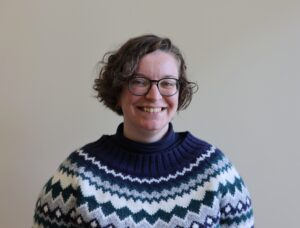 Following the January wildfires, Episcopal Relief and Development awarded the Diocese of Los Angeles a grant to fund a diocesan missioner for disaster recovery and resilience. Grace Wakely-Lynch as been hired for the role. The position is new to the Los Angeles diocese, and many dioceses around the wider church have an equivalent position.
Following the January wildfires, Episcopal Relief and Development awarded the Diocese of Los Angeles a grant to fund a diocesan missioner for disaster recovery and resilience. Grace Wakely-Lynch as been hired for the role. The position is new to the Los Angeles diocese, and many dioceses around the wider church have an equivalent position.
Wakelee-Lynch has a background in food-access, serving most recently at Foothill Unity Center, a food bank and social services center in the San Gabriel Valley, and Feeding the Foothills, Feeding America Food Bank in Roseville, near Sacramento. During her time in Northern California, there were several wildfires, and the foodbank focused on support to those affected by the fires as well as first responders. Foothills Unity Center has also been supporting many families still recovering from the fire through various needs.
“We are grateful to Episcopal Relief and Development for their ongoing support of our diocese post Eaton and Palisades fires,” said the Rev. Canon Melissa McCarthy, diocesan canon to the ordinary. “Episcopal Relief and Development always shows up and they make such a difference in times like this.
“Grace Wakelee-Lynch has a deep knowledge of the Episcopal Church and a stellar background in community engagement through her work with large food banks in the area. She is gifted with an entrepreneurial spirit and a heart for justice, which makes her a perfect fit for this role. We are so glad to welcome Grace to our staff.”
Bishop John Harvey Taylor joined McCarthy in welcoming Wakelee-Lynch to her new office at St. Paul’s Commons.
Wakelee-Lynch said that in past jobs, she has done program development, logistical coordination, volunteer management, and has often served as a central point of contact, connecting different branches of the work and facilitating communication. Wakelee-Lynch hopes to apply these skills in a role focused on the diverse needs of diverse recovering communities.
The needs of her clients in her most recent role, Wakelee-Lynch said, are diverse and vary based on many factors, including if they owned a home or were renters, their insurance, their jobs, their immigration statuses, and more. “I don’t think there are two people who have the same circumstance.”
She anticipates similarly diverse needs and challenges working with those affected by disaster within the diocese, and emphasizes the need to work with and learn from those most affected, at the congregational and individual level.
“Doing the work that I’ve been doing in the [San Gabriel] Valley, meeting people every day who come in dealing with stuff they never dreamed they would have to deal with because of losing their homes, and just getting to talk to them, getting to hear their stories, hopefully helping a little bit with whatever they brought in that they needed help with, it has felt really important supporting that work,” Wakelee-Lynch said.
Wakelee-Lynch said she hopes that in building out the role and formalizing procedures for disaster response, the diocese will already have a strong framework the next time disaster may strike.
“The goal is education and prevention and preparedness, so that when the next thing happens, we’re more ready to jump in and be like, ‘Okay, we know what needs to happen. We know what needs to be done. Here are the different phases that we’re expecting to see, here’s what we do.'”
In addition to facilitating and supporting long-term fire recovery, Wakelee-Lynch will work with the Climate Connections Initiative, in collaboration with the Dr. Lucy Jones Center.
Wakelee-Lynch also has a long-time relationship with the diocese. Her mother was an associate rector at St. Luke’s Long Beach, and she was baptized in the diocese, and spent many summers at Camp Stevens, first as a camper and then as a counselor. It was at Camp Stevens, leading a counselor training, that Wakelee-Lynch first learned of the missioner for disaster recovery and resilience role, and decided to apply.
“I’m just really, really grateful to be here and excited to be a part of the work that’s going on right now,” Wakelee-Lynch said.
